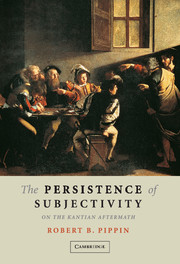Book contents
- Frontmatter
- Contents
- Acknowledgments
- The Persistence of Subjectivity
- 1 Introduction: “Bourgeois Philosophy” and the Problem of the Subject
- PART I SETTING
- PART II THEORISTS
- 3 Necessary Conditions for the Possibility of What Isn't: Heidegger on Failed Meaning
- 4 Gadamer's Hegel: Subjectivity and Reflection
- 5 Negative Ethics: Adorno on the Falseness of Bourgeois Life
- 6 The Unavailability of the Ordinary: Strauss on the Philosophical Fate of Modernity
- 7 Hannah Arendt and the Bourgeois Origins of Totalitarian Evil
- 8 On Not Being a Neo-Structuralist: Remarks on Manfred Frank and Romantic Subjectivity
- 9 Leaving Nature Behind, or Two Cheers for Subjectivism: On John McDowell
- Postscript: On McDowell's Response to “Leaving Nature Behind”
- PART III MODERN MORES
- PART IV EXPRESSION
- Bibliography
- Name Index
- Subject Index
3 - Necessary Conditions for the Possibility of What Isn't: Heidegger on Failed Meaning
Published online by Cambridge University Press: 05 June 2012
- Frontmatter
- Contents
- Acknowledgments
- The Persistence of Subjectivity
- 1 Introduction: “Bourgeois Philosophy” and the Problem of the Subject
- PART I SETTING
- PART II THEORISTS
- 3 Necessary Conditions for the Possibility of What Isn't: Heidegger on Failed Meaning
- 4 Gadamer's Hegel: Subjectivity and Reflection
- 5 Negative Ethics: Adorno on the Falseness of Bourgeois Life
- 6 The Unavailability of the Ordinary: Strauss on the Philosophical Fate of Modernity
- 7 Hannah Arendt and the Bourgeois Origins of Totalitarian Evil
- 8 On Not Being a Neo-Structuralist: Remarks on Manfred Frank and Romantic Subjectivity
- 9 Leaving Nature Behind, or Two Cheers for Subjectivism: On John McDowell
- Postscript: On McDowell's Response to “Leaving Nature Behind”
- PART III MODERN MORES
- PART IV EXPRESSION
- Bibliography
- Name Index
- Subject Index
Summary
In his famous interviews with François Truffaut, Alfred Hitchcock insisted that while many of his thrillers concerned some piece of information or object, around which all the intrigue and energy of the film swirled, it didn't matter if that object was never identified, that it could even turn out to be nothing at all, of no serious importance in itself. Borrowing from some Kipling stories, he called such an elusive object of attention a “MacGuffin” and went on to say,
My best MacGuffin, and by that I mean the emptiest, the most nonexistent, and the most absurd, is the one we used in North by Northwest … Here, you see, the MacGuffin has been boiled down to its purest expression: nothing at all.
In 1987, the great twentieth-century intellectual historian Hans Blumenberg, in a supremely backhanded compliment, noted the effectiveness of Heidegger's “question about the meaning of Being” in functioning in just this Hitchcockean way. In a clever rejoinder to Heidegger, Blumenberg titled his article, “Das Sein – Ein MacGuffin,” thereby deliberately invoking Hitchcock's own description of the MacGuffin, “boiled down to its purest expression: nothing at all.”
The cleverness of this invocation of the nothingness of the Heideggerean MacGuffin, Sein, derives from the enormous if infamous and elusive importance that Heidegger himself ascribes to “the nothing,” das Nichts.
- Type
- Chapter
- Information
- The Persistence of SubjectivityOn the Kantian Aftermath, pp. 57 - 78Publisher: Cambridge University PressPrint publication year: 2005
- 2
- Cited by



